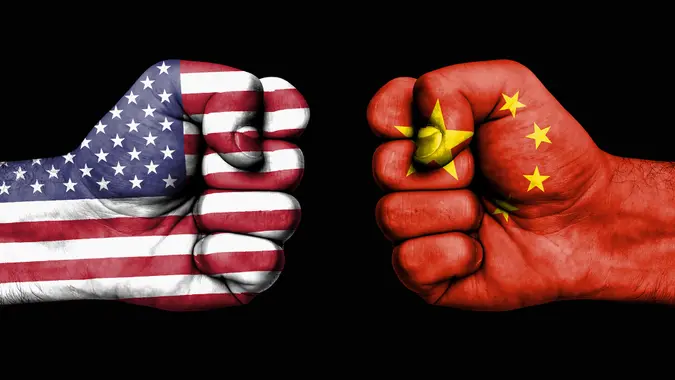4 Ways the Middle Class Can ‘Tariff-Proof’ Their Wealth

Commitment to Our Readers
GOBankingRates' editorial team is committed to bringing you unbiased reviews and information. We use data-driven methodologies to evaluate financial products and services - our reviews and ratings are not influenced by advertisers. You can read more about our editorial guidelines and our products and services review methodology.

20 Years
Helping You Live Richer

Reviewed
by Experts

Trusted by
Millions of Readers
Panic, dread and confusion are running high as President Donald Trump made good on his promise to impose tariffs on imported goods. Eighteen countries and the European Union, which comprises 27 countries, are paying a minimum of 10% in tariffs, but those classified by Trump as the “worst offenders,” which is most of them, are paying more.
On April 5, 2025, the 10% baseline tariffs went into effect on the following countries: United Kingdom, Singapore, Brazil, Australia, New Zealand, Turkey, Colombia, Argentina, El Salvador, United Arab Emirates and Saudi Arabia. Custom tariffs for “worst offenders” went into effect on April 9. These groups pay an elevated rate: European Union: 20%; Vietnam: 46%; Thailand: 36%; Japan: 24%; Cambodia: 49%; South Africa: 30%; Taiwan: 32% and China: 104%.
Americans of all wealth statuses are concerned about the impact of tariffs on the prices of various goods, but members of the middle class and below have the most reason to be. A recent study by The Budget Lab found that the tariffs enacted on April 9 would cost an average family an extra $4,700 a year — an amount of money that many households cannot afford to part with.
How can the middle class “tariff-proof” their wealth? Let’s see what financial experts recommended.
Prioritize Essentials and Your Emergency Fund
The first thing you need to do to protect your wealth amid tariffs is to prioritize essential expenses — even more so than you do now. You should also ensure your emergency fund is well funded (six months of living expenses set aside).
“Focusing on necessities like housing, food, transportation and healthcare can help maintain stability when prices start to climb,” said Einat Steklov, co-founder and CEO at Kashable. “It’s also wise to set aside a small ‘rainy day’ amount whenever possible. Even a modest emergency fund can act as a buffer when costs exceed what was originally budgeted, helping to avoid high-interest borrowing or delayed bills.”
Analyze Your Budget Every Month
You’re probably no stranger to budgeting — much of which hinges on being able to predict as many incoming expenses as possible. Right now, we’re in a little bit of a limbo as we haven’t yet seen just how profoundly we’ll feel the impact of tariffs. We know costs will go up on many everyday items, and we know some retailers are being very upfront about raising prices, but we don’t have 100% transparency. Though we can’t accurately predict how our budgets will be hit by tariffs, we can respond by analyzing our budgets each and every month.
“Close your books by the 10th of each month,” said Jay Jung, president and founder at Embarc Advisors. “Regularly compare budget versus actuals. Most importantly, have a strategic discussion on beats and misses. Build a detailed budget, but don’t stop there — conduct a monthly budget versus actual analyses to stay informed and adapt quickly.”
Move Emergency Savings to a High-Yield Savings Account
Tariffs can contribute to inflation, as businesses often pass the extra costs they’re paying on imported goods onto consumers. Help your money hedge against inflation by placing any liquid savings, such as cash set aside for emergencies, into a high-yield savings account (HYSA).
“Move your money to a high-yield savings account. Right now, you should be looking for accounts paying at least 3% to keep up with rising costs,” said Tim Newell, CEO and founder at GreenFi. “Leaving your savings in a low-interest account at a big bank could cost you hundreds or even thousands over the next few years.”
Diversify Investments With a Global Approach
It’s important to diversify your investment portfolio no matter the economic climate, but right now, with the tariffs triggering major stock market volatility, it’s more important than ever. Take a global approach.
“Since the president took office a few months ago, international stocks have outperformed American stocks by 15%,” said Brian Page, M.Ed., AFC candidate, Fair Play Certified, CPFFE, founder at Modern Husbands. “Nobody knows whether this trend will continue, which is the point of diversification.”
Page recommended including low-cost global index funds in your retirement portfolio “to help you maintain exposure without overcommitting to any one economy.”
More From GOBankingRates
Sources
- Einat Steklov, Kashable
- Jay Jung, Embarc Advisors
- Tim Newell, GreenFi
- Brian Page, Modern Husbands
 Written by
Written by  Edited by
Edited by 

























